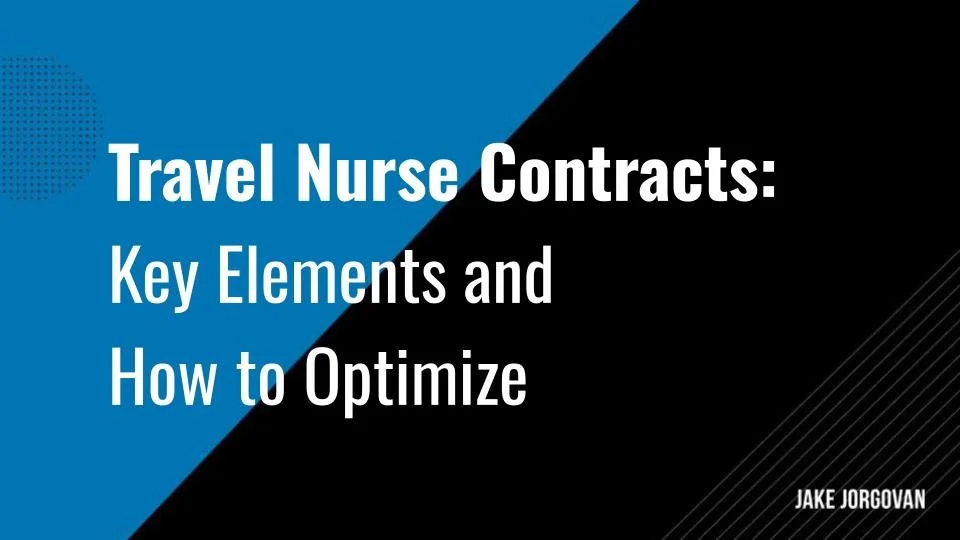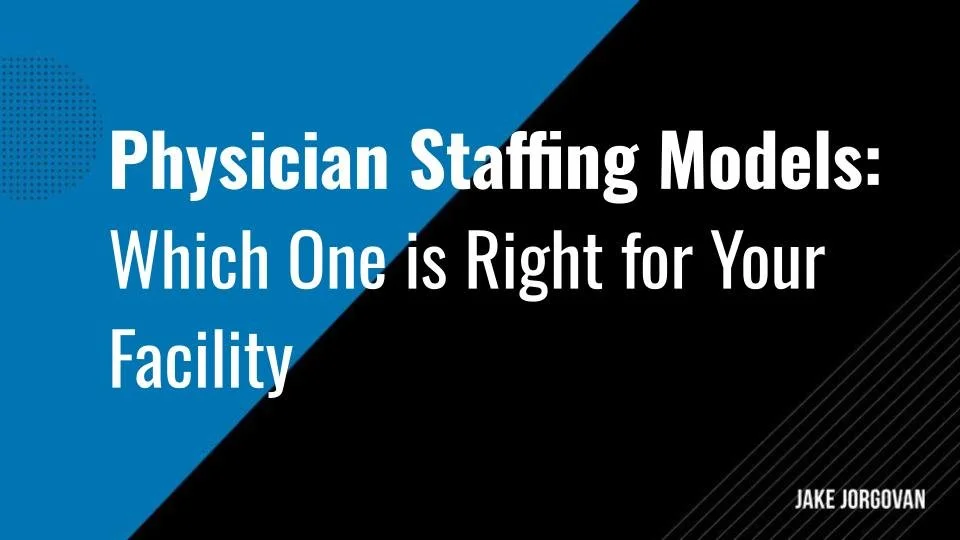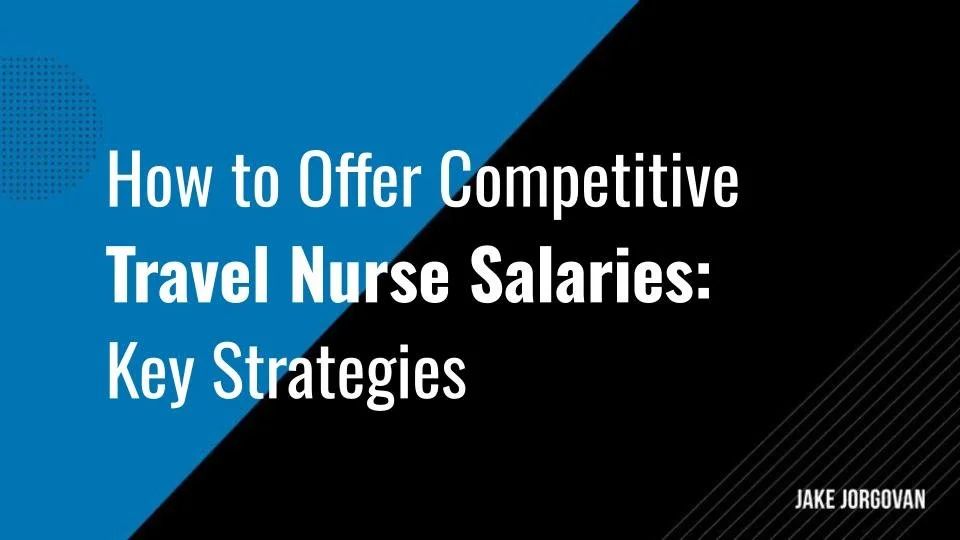How to Offer Competitive Travel Nurse Salaries: 5 Key Strategies
The demand for travel nurses is high, and so is the competition. Organizations must implement effective strategies to stay ahead.
Without a solid plan, you risk losing qualified candidates to competitors. Understanding market trends and nurses' needs is key.
And tailoring your salary packages can make all the difference.
This guide outlines 5 essential strategies for offering competitive travel nurse salaries.
Continue reading to maximize your recruitment efforts with these proven tips.
How Much Do Travel Nurses Make?
As of 2024, the average annual salary for travel nurses in the United States is approximately $105,021, or about $50 per hour, according to ZipRecruiter. This is significantly higher than the average salary for registered nurses, which is $81,220 per year, as the map below shows:
The salary for travel nurses can vary widely depending on several factors, including location, specialty, and demand. For example, travel nurses in Nevada can earn a median weekly salary of $2,486, which is about 21% higher than the national average. Other high-paying states include Alaska, Maine, and California.
Travel nurse salaries also differ by specialty. High-paying specialties include First Assist, CVOR (Cardiovascular Operating Room), and Interventional Radiology, with weekly salaries ranging from approximately $2,500 to $2,700.
In addition to base pay, travel nurses often receive various benefits that enhance their overall compensation. These benefits can include housing stipends, travel reimbursements, health insurance, bonuses, and education reimbursement.
Trends in Travel Nurse Recruitment
The travel nursing industry continues to evolve, with new trends shaping how agencies attract and retain top talent. Staying ahead of these trends can help recruiters remain competitive in a high-demand market. Here are five key trends in travel nurse recruitment and why they matter:
1. Increased Demand for Specialized Nurses
Hospitals and healthcare facilities are placing a stronger emphasis on hiring travel nurses with specialized skills. Fields such as ICU, ER, telemetry, and labor and delivery are seeing heightened demand due to staffing shortages and an aging population requiring complex care. Travel nurses with advanced certifications and experience in these areas command higher salaries and have more job opportunities.
2. Higher Pay Packages & Incentives
Competitive compensation remains a top priority for travel nurses. With ongoing nursing shortages, many facilities are offering higher pay rates, completion bonuses, and tax-free stipends to attract talent. Some agencies are also introducing flexible payment structures, such as same-day pay options, to cater to nurses looking for financial stability while on assignment.
3. Shift Toward Flexible Assignments
Traditional 13-week contracts are no longer the only option. More facilities are offering shorter contracts (4–8 weeks) or extended contracts (20+ weeks) to better align with hospital needs and nurse preferences. Flexibility in contract length allows nurses to explore different opportunities while giving employers a better chance of filling urgent vacancies.
4. Emphasis on Work-Life Balance and Well-Being
Burnout remains a serious issue in the healthcare industry, at a rate of 43%. Travel nurse recruiters are increasingly offering wellness programs, mental health support, and better work-life balance initiatives to retain their workforce. Providing resources such as stress management programs, counseling services, and better scheduling flexibility can make an agency more attractive to top talent.
5. Increased Use of Technology in Recruitment
Digital transformation is playing a major role in travel nurse hiring. More agencies are using AI-driven job-matching platforms, automated scheduling systems, and mobile-friendly applications to streamline the recruitment process. Agencies that adopt tech-driven solutions reduce hiring delays, improve communication, and improve the overall candidate experience.
By adapting to these trends, travel nurse recruiters can better meet the expectations of nurses while ensuring healthcare facilities receive the specialized support they need.
5 Strategies for Offering Competitive Travel Nurse Salaries
After understanding the compensation and trends in the travel nurse industry, let’s see how you can offer better monetary packages.
1) Research Market Rates and Adjust Salaries
Travel nurse salaries can vary quite a bit, as the graphic below shows:
To attract and retain top travel nurse talent, it's crucial to stay competitive with your salary offerings. Knowing how to set competitive rates involves more than just a quick search online. It requires a detailed, strategic approach. Here's how you can do it effectively:
Analyze Local Market Rates: Start by examining the local pay rates for travel nurses in your area. Use industry-specific sources like nursing salary surveys and reports from trusted organizations. Look at both average and top-end salaries.
Compare Competitor Offers: Investigate what your competitors are offering. Check job boards, agency websites, and industry forums to see the range of salaries and benefits being advertised. Identify patterns and stand-out offers.
Adjust for Specializations: Recognize that specialized skills command higher pay. Evaluate the demand for particular specialties within travel nursing, like ICU or ER nurses, and adjust your salary offerings accordingly. In 2023, for example, the highest number of listings for travel nurses was in emergency departments, suggesting a continued need for these clinicians.
Consider Cost of Living Adjustments: Factor in the cost of living in different locations. A competitive salary in a rural area might be less appealing in a major city, so use cost-of-living calculators to fine-tune your pay rates.
Review and Update Regularly: Market conditions change, and so should your salary offerings. Schedule regular reviews of your pay rates to ensure they remain competitive. Quarterly or bi-annual reviews are a good practice.
Insider Tip: We recommend using salary negotiation as a tool. If a candidate is hesitant, it's best to always engage in open dialogue about their needs and expectations. This approach often reveals gaps you can fill and make your offer more appealing without overshooting your budget.
2) Offer Sign-On and Completion Bonuses
Offering sign-on and completion bonuses enhances your recruitment strategy. These bonuses attract skilled travel nurses and also encourage them to fulfill their contracts. Implementing a structured approach to bonuses helps you maximize their effectiveness and value.
To create an effective bonus structure, start by defining competitive bonus amounts that align with industry standards and your budget. Research the average bonuses in your area to ensure your offers remain attractive while staying financially sustainable. Next, establish clear eligibility criteria, whether based on contract length, specific assignments, or particular specialties. Communicating these requirements transparently to potential candidates helps set expectations.
Once eligibility is defined, structure payment schedules strategically. Consider splitting bonus payments between the start and end of contracts to incentivize completion. For example, offering a portion of the bonus upon signing and the remainder upon successful contract fulfillment can encourage commitment.
Promote your bonuses effectively by incorporating them into job postings, interviews, and marketing materials. Making them a key part of your recruitment pitch helps capture attention and differentiates your offer from competitors. Social media can be a useful tool here, as shown below:
Finally, regularly evaluate and adjust your bonus program. Gather feedback from current nurses and analyze recruitment data to determine what’s working and where improvements are needed. Adjust bonus amounts and eligibility criteria as necessary to maintain a competitive edge.
Insider Tip: Our research shows that personalized bonuses can be particularly effective. Tailoring bonus amounts to individual candidates based on their experience or specialty can make your offers more compelling. This personalized approach often leads to higher acceptance rates and greater job satisfaction.
3) Provide Housing Stipends or Accommodation
Providing housing stipends or accommodations is a key strategy for attracting travel nurses. The graphic below shows how this might factor into total compensation:
Housing support reduces their living expenses and also makes the transition to a new location smoother. To implement an effective housing policy, consider these steps:
Determine Stipend Amounts: Calculate competitive housing stipends based on the cost of living in different locations. Use reliable cost-of-living indices and rental market data to set appropriate amounts.
Offer Flexible Options: Nurses should be able to choose between a housing stipend and agency-arranged accommodations. Flexibility caters to individual preferences and can be a decisive factor for many nurses.
Negotiate with Housing Providers: Establish partnerships with apartment complexes and extended-stay hotels to secure favorable rates. Bulk agreements can yield discounts that benefit both your agency and the nurses. Furnished Finder offers a Housing Stipend Calculator that provides a breakdown of available housing options and average rates in specific areas, which can assist in negotiations.
Streamline the Process: Make the housing arrangement process as smooth as possible. Provide clear instructions, a list of recommended housing options, and a dedicated contact person for support. Efficiency and clarity are crucial.
Monitor and Adjust: Review feedback from nurses about their housing experiences regularly. Adjust stipend amounts and housing options based on this feedback to improve the program continually. Also, encourage travel nurses to actually use this stipend or they can face serious consequences, like paying back taxes.
Insider Tip: We suggest using short-term rental platforms as a housing option. This flexibility can accommodate nurses' varying assignment lengths and personal preferences. Partnering with these platforms usually provides better rates and more choices, enhancing our overall housing offerings.
4) Include Comprehensive Benefits Packages
Comprehensive benefits packages are essential for attracting and retaining top travel nurses. Benefits (like those shown in the graphic below) are a significant part of the overall compensation package and can sometimes be the deciding factor for many professionals.
To build an appealing benefits package, start by assessing the essential benefits that travel nurses value most. These typically include health, dental, and vision insurance. These benefits should be competitive with industry standards to attract top talent.
Next, add retirement plans such as a 401(k) with employer matching. Providing long-term financial security makes your offer more attractive and encourages retention.
Paid time off (PTO) is another critical component. Allocating PTO for vacations, sick leave, and holidays shows that you value work-life balance, which can significantly impact job satisfaction.
Supporting professional growth through continuing education opportunities is also key. Offering tuition reimbursement, access to online courses, or time off for attending conferences helps nurses advance in their careers while staying engaged.
Additionally, wellness programs that address physical and mental health should be included. Providing benefits like gym memberships, mental health support, and wellness workshops can contribute to overall job satisfaction and well-being.
5) Implement a Tiered Pay Structure for Experience and Specialty Skills
There are many different levels of experience and skill for nurses, as shown in the image below, and pay should reflect that.
Implementing a tiered pay structure for experience and specialty skills can set you apart in the competitive travel nursing market. This approach rewards nurses for their expertise and incentivizes them to develop specialized skills. To create an effective tiered pay system, follow these steps:
Identify Key Tiers: Define clear tiers based on experience and specialties. For example, you might have entry-level, mid-level, and senior tiers, with additional distinctions for specialties like ICU or OR nursing.
Set Competitive Rates: Assign pay rates to each tier that reflect market standards and your budget. Use industry salary surveys and data to ensure your rates are attractive and competitive.
Develop Transparent Criteria: Establish clear criteria for moving between tiers. This can include years of experience, certifications, and completion of specific training programs. Communicate these criteria clearly to all nurses. For example, obtaining additional certifications like Advanced Cardiac Life Support (ACLS) or Pediatric Advanced Life Support (PALS), can make nurses more competitive and may lead to salary increases.
Incorporate Performance Reviews: Use regular performance reviews to assess qualifications for tier advancement. These reviews should evaluate both skills and job performance, providing a fair basis for pay increases.
Provide Continuous Training: Offer opportunities for nurses to gain the skills needed to advance to higher tiers. This includes providing access to certifications, workshops, and mentorship programs.
Common Mistakes with Travel Nurse Compensation
Setting competitive travel nurse compensation requires careful planning. However, many healthcare facilities and staffing agencies make critical mistakes that can lead to high turnover, dissatisfaction, and difficulty attracting the best talent. Here are five common mistakes and how to avoid them:
1. Offering Non-Competitive Pay Rates
Failing to stay updated on current market rates can result in compensation packages that are too low to attract quality candidates. Travel nurses have many options, and they will choose agencies that offer better pay and benefits.
How to avoid it: Regularly analyze salary trends using industry reports, job boards, and competitor research to ensure your rates remain competitive.
2. Ignoring Cost of Living Differences
A standard pay rate across different locations can create issues. A salary that works in a low-cost rural area may not be sufficient for a major city where rent and living expenses are much higher.
How to avoid it: Adjust pay rates based on location using cost-of-living calculators and ensure stipends reflect regional differences.
3. Lack of Transparency in Pay Breakdown
Some agencies present attractive pay packages without clearly explaining how much is taxable income, stipends, or bonuses. Travel nurses who later realize deductions or unexpected costs feel misled and may leave for a more transparent employer.
How to avoid it: Clearly outline base pay, stipends, reimbursements, and deductions in all job postings and offer letters. This kind of transparency builds trust and reduces disputes.
4. Inconsistent or Delayed Payments
Delays in paychecks or discrepancies in payment structures can quickly erode trust and push travel nurses to more reliable employers.
How to avoid it: Implement a reliable payroll system with consistent pay cycles, and offer direct deposit or same-day pay options when possible.
5. Failing to Offer Competitive Benefits
Many travel nurses look beyond just salary when choosing assignments. Poor benefits, such as weak health insurance options, lack of PTO, or no retirement contributions, can lead them to choose other agencies.
How to avoid it: Provide strong benefits, including health coverage, PTO, 401(k) options, and wellness programs, to make your offers more attractive and improve retention.
Avoiding these common mistakes can help agencies build stronger relationships with travel nurses, reduce turnover, and maintain a reputation as a top employer in the industry.
Attract and Retain the Best Travel Nurse Talent
Offering competitive travel nurse salaries is a necessity.
The strategies we discussed above are your tools for success.
Implement them correctly and watch your recruitment efforts thrive.
Ask yourself: Are you truly offering what top talent seeks?
The healthcare landscape is evolving, and so must your approach.
FAQ — Compensating Travel Nurses
What are compensation plan strategies for travel nurses?
Compensation strategies for travel nurses include competitive base pay, tax-free stipends for housing and meals, performance incentives, flexible pay schedules, and comprehensive benefits to improve retention and satisfaction.
How do you design a compensation strategy for travel nurses?
A well-designed compensation strategy considers market pay rates, cost-of-living adjustments, specialty demand, tax-free stipends, and benefits like PTO and retirement plans to attract talented nurses while staying within budget.
What is a common mistake when planning travel nurse compensation?
A common mistake is failing to adjust pay based on location, which can lead to uncompetitive salaries in high-cost areas or overpaying in lower-cost regions and impact hiring success and profitability.




































